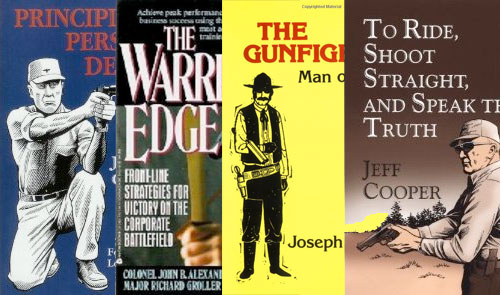 Many years ago, while attending a seminar on Instructional Skills/Adult Learning Theory, the instructor passed on this little tidbit…
Many years ago, while attending a seminar on Instructional Skills/Adult Learning Theory, the instructor passed on this little tidbit…
We retain 90% of what we DO…
30% of what we SEE…
20% of what we HEAR…
10% of what we READ…
I’m sure someone will take exception to these stats or even present different statistics which is fine. ..go for it. That said, based on my life experience, this just “feels” true. It’s why you can’t learn to shoot by reading a book. The best way to learn the combative application of the pistol is for a skilled instructor to explain why they teach a tactic or technique the way they do (hear), then demonstrate it being performed correctly (see) and then have the student(s) practice the tactic/technique under the instructor’s watchful eye to correct any mistakes. By going through this process, we offer the student the best chance for success. It would lead one to believe that reading is a waste of time, right?
Nothing could be further from the truth! I am a big reader…ferocious, really…I might have five different books going at any given time and I believe that I retain a great deal more than 10% of what I read, but then I am reading for retention. I want to remember as much as possible so that I can put the information to good use later. I read books of all genres but gun books are certainly one of the top two categories of books I read. I have met many instructors who have no interest in what other instructors have to say, after all their doctrine is perfect and needs no modification. I am just the opposite, I teach what I do as I believe it to be the method available but I certainly want to know if something better exists! Thus I read books written by many, many authorities on the combative pistol even if I don’t like them personally.
I have met many instructors I believe are “whack jobs” but that doesn’t mean what they teach is bad…hell, it might be exceptional! I don’t have to be some instructor’s disciple or acolyte to appreciate their doctrine; it just has to pass my Three S Test. Is it simple to do, make sense based on my life experience and is it street proven in actual combat? If so, I want to know more about it and if I am convinced it is better that what I am offering, I will change instantly and give this instructor complete attribution. I owe this to my students who will use what I teach them to save their lives or the lives of those they care about. This is too important to screw around with and the best way to learn what a given instructor believes/teaches is to read their book. It’s simple, cost effective and can be done on my time frame. If I like what I read, I will seek them out and train with them.
I recently appeared on The Personal Armament Podcast with Rob Robideau when the topic of my “favorite” guns books came up. Rob wanted to pass this info on to his listeners in the event they wanted to follow up and read for themselves. Several classics came to mind immediately, but I had to beg off temporarily as I wanted to make the list as complete as possible. After doing so, I thought the list was pretty good and thought I would pass it on to the readers of this blog. I have selected these titles as they have helped me create my doctrine for the application of the combative pistol. I know that some people will disagree, but these are my favorites as they helped build the program I currently teach… it’s perfectly ok to like other books for whatever reason. They are listed in no specific order:
- The Principals of Personal Defense by Jeff Cooper.
- Shoot to Live by William Fairbairn
- The Warriors Edge by Alexander, Groller and Morris
- Sources of Power by Gary Klein
- Unleashing the Warrior Within by Richard Machowicz
- Motor Learning Performance by Richard Schmidt
- The Gunfighter: Man or Myth by Joseph G. Rosa
- The Modern Technique of the Pistol by Gregory Morrison
- Street Smarts, Firearms and Personal Security by Jim Grover
- The Deadliest Men (both volumes) by Paul Kirchner
- The Tactical Pistol by Gabriel Suarez
- Fight at Night by Andy Stanford
- In the Gravest Extreme by Massad Ayoob
- Practical Shooting by Brian Enos
- Shooting from Within by J. Michael Plaxco
- Deadly Force Encounters by Dr. Alexis Artwohl
- To Ride, Shoot Straight and Speak the Truth by Jeff Cooper
- Tactical Reality by Louis Awerbuck
- The Snubby Revolver by Ed Lovette
No, it’s not a short list but compared to the hundreds of books I have in my library it is quite succinct! Also, they are not all books about how to shoot a handgun, but the content of each is certainly relevant to the task. Whether you like or agree with the above listed authors is irrelevant, they all have something worthwhile to say. If you are interested in how I go about teaching the combative handgun, check out Handgun Combatives (second edition) and Defensive Living (second edition) with Ed Lovette.
Happy reading!
 Dave Spaulding is the 2010 Law Officer Trainer of the Year and Law Officer’s Firearms columnist. A 28-year law enforcement veteran who retired at the rank of lieutenant, he is the founder of Handgun Combatives. He has worked in corrections, communications, patrol, evidence collection, investigations, undercover operations, training and SWAT—and has authored more than 1,000 articles for various firearms and law enforcement periodicals. He’s also the author of the best-selling books Defensive Living and Handgun Combatives. Visit his web site at www.handguncombatives.com and like him on Facebook.
Dave Spaulding is the 2010 Law Officer Trainer of the Year and Law Officer’s Firearms columnist. A 28-year law enforcement veteran who retired at the rank of lieutenant, he is the founder of Handgun Combatives. He has worked in corrections, communications, patrol, evidence collection, investigations, undercover operations, training and SWAT—and has authored more than 1,000 articles for various firearms and law enforcement periodicals. He’s also the author of the best-selling books Defensive Living and Handgun Combatives. Visit his web site at www.handguncombatives.com and like him on Facebook.

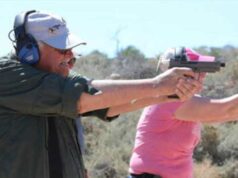
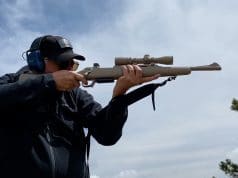
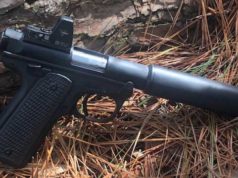
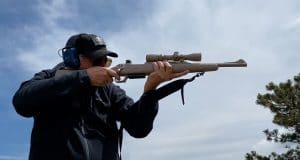
Great post Dave! There is no doubt that reading is an outstanding way to learn. As a professional teacher I was always fascinated and intrigued when 2nd, 3rd, and 4th graders made the transition from learning to read to reading to learn! All of a sudden the world was at their finger tips.
It isn no different for adults. If we allow ourselves to learn through reading we can gather new information, find ideas that tie important information together, and find evidence that supports what we already know.
I never am at a time in my life when I am reading a book typically there are 3 or 4 that are dog eared, written on and in, underlined, highlighted etc. Books are a great medium!
I look forward to seeing you in June!
Regards,
Paul
Good article Dave.
I might suggest your list also include Jim Cirillo’s ‘Guns, Bullets and Gunfights’, SGM Kyle Lamb’s ‘Green Eyes, Black Rifles’, Paul Howe’s ‘Leadership and Training for the Fight’, and Lawrence Blum’s ‘Force Under Pressure-How Cops Live and Why They Die’
A non-fiction book worth the time to read that covers similar subject matter is ‘Gates of Fire’ by Steven Pressfield, which is a novel ref the Spartans that leads to the stand at Thermopylae
Well done Dave,